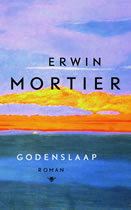Erwin Mortier
Divine Sleep (Godenslaap)
Major history and minor humans
The First World War is the main theme of Erwin Mortier’s new novel Godenslaap (Divine Sleep), its magnitude and impact taking form in the recollections jarred down daily by the elderly Helena in her notebooks. Helena’s father was a prosperous Flemish merchant, and her mother a Walloon from a rich family in French Flanders. She has fond memories of summer holidays at her uncle’s large country house in France before the war, which is where, when war breaks out, she is sent by her father with her mother and siblings, in the hope that this will prevent her brother Edgar from volunteering for military service. No one can predict that an important part of the war will be fought in that part of the country.
Erwin Mortier splendidly elaborates the contrast in character between the enterprising Helena and her respectable, matronly mother. She is not enthusiastic about Helena’s relationship with Matthew, a British Army photographer (who will later become her husband). Helena visits front-line trenches with him, but then their ways part. Surprisingly, it is through the mother that Helena meets him again when she goes with her to visit the wounded Edgar at the hospital where Matthew happens to be lodging. That same evening, the hospital comes into the firing line and the two women witness scenes of indescribable horror.
How can the personal dislocation of war be recorded so as not to fade or diminish? In her memoirs, Helena wishes to master words in order to describe the indescribable, but she puts this attempt into perspective: ‘can we ever do anything else, I ask myself, but tell fairy stories burdened with footnotes?’
This ‘anything else’ is what Erwin Mortier convincingly achieves in Godenslaap. First he paints a broad, stately, nostalgic fresco of ‘the entire propriety of good citizenship and norms.’ During the war, this world collapses in ruin and most characters are concerned only with trying to remain human in inhuman circumstances. Nothing spectacular happens in the story; Mortier is more concerned with animating such concepts as war, history and the past, imaginatively, with great empathy and engagement, with a mixture of melancholy, qualification and resignation. Its theme complements the novels of Ian McEwan and Philippe Claudel, while its monumental, yet subtly style it reminiscent of Marcel Proust and Virginia Woolf.
Publisher
De Bezige Bij
Van Miereveldstraat 1
NL - 1071 DW Amsterdam
TEL. +31 20 305 98 10
FAX +31 20 305 98 24
E-mail: [email protected]
Website: www.debezigebij.nl
Publishing details
Godenslaap (2008, 405 pp)

Biography
Marcel (1999), the first novel by Erwin Mortier (b. 1965), was awarded several prizes and nominated for the most important literary prizes of the Netherlands and Flanders. With his following novels Mijn tweede huid (My Fellow Skin, 2000) and Sluitertijd (Shutterspeed, 2002) and the novella Alle dagen samen (All Days Together, 2004) he quickly built up a reputation as one a prominent author of his generation. He also received awards for his poetry collections such as Vergeten licht (Forgotten Light, 2001), Uit één vinger valt men niet (One Does Not Fall from One Finger, 2005) and Voor de stad en de wereld (For the City and the World, 2006). In addition, he published a collection of essays entitled Pleidooi voor de zonde (Plea for Sin, 2003) as well as Avonden op het landgoed. Op reis met Gerard Reve (Evenings on the Estate. Travelling with Gerard Reve, 2007). Erwin Mortier often allows children to evolve innocently and unconsciously under the emotional fall out of the complex lives of adults who are carrying a burden from the past. A grand stylist, his evocative descriptions brilliantly bring past worlds to life.
Website: www.erwinmortier.be
Quotes
Mortier writes so well that you are inclined to see everything else as of secondary importance.
NRC Handelsblad
Splendid control of language
de Volkskrant
If Marcel Proust had a descendant somewhere in Flanders, he must be born in Ghent.
Knack
A monumental, phenomenal book.
De Morgen
